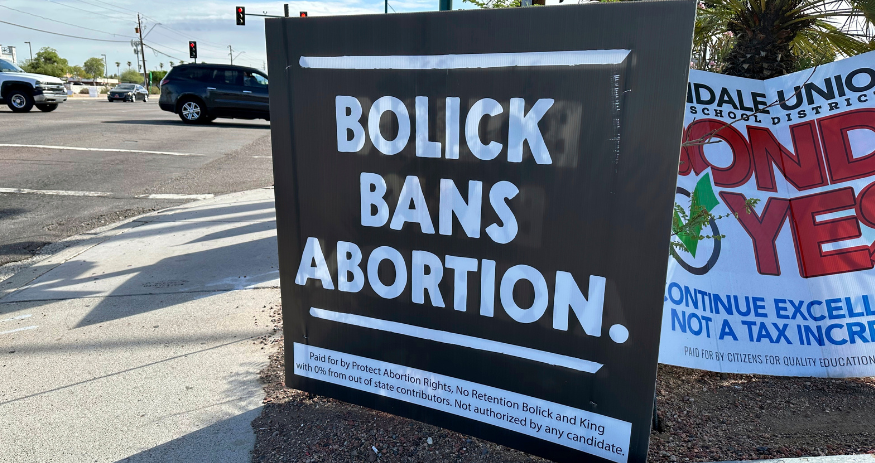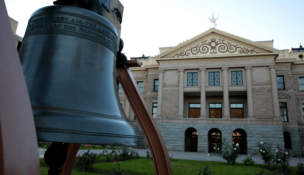Justices fend off removal, voters keep power over the bench
Kiera Riley Arizona Capitol Times//November 8, 2024//
Justices fend off removal, voters keep power over the bench
Kiera Riley Arizona Capitol Times//November 8, 2024//
Voters kept two state Supreme Court justices on the bench and roundly rejected a measure poised to walk back the results of the 2024 retention election and limit when and how often voters can weigh in on whether to fire judges.
Election results painted an existential picture of how the state’s voters sat with and acted on judicial candidates, and how they valued the civic power to keep or kick out judges.
Initial election results showed 79% of voters rejected Proposition 137, a measure poised to nullify results of the 2024 retention election and effectively do away with judicial term limits.
As for how individual judges fared, Supreme Court Justices Clint Bolick and Kathryn King are likely to stay on the bench, per initial returns, with Bolick seeing support for his retention from 58.42% of voters, and King receiving 59.47%.
All four Arizona Court of Appeals judges and all 42 Maricopa County Superior Court judges are safe, too, with early results awarding some sizable margins.
The 2024 retention election served as a turning point for the typically lackluster portion of the ballot. Justices at the top of the ticket prompted high-ticket campaigns both for and against and some zeal on judicial races drifted down to Superior Court judges, too.
Campaigns for and against retention coalesced around Bolick and King.
Those seeking to see the two booted from the bench primarily highlighted their vote on the ruling keeping the state’s 1864 abortion ban intact and touched on past rulings striking down school funding initiatives.
Opposing groups noted Bolick’s past work on litigation for the Goldwater Institute, Institute for Justice and the American Federation for Children and King’s past work as former Gov. Doug Ducey’s deputy general counsel and as a corporate litigator.
Judicial Independence Defense PAC, a group seeking to keep Bolick and King on the bench, highlighted the threat of Gov. Katie Hobbs appointing two new “liberal” justices to the bench in the event of Bolick and King’s exit and made a general plea for voters to reject the “politicization” of the judiciary.
Judicial Independence Defense PAC brought in high dollar donations from in-state and out-of-states, including $125,000 from Randy Kendrick, Goldwater Institute board member and wife of Arizona Diamondbacks managing general partner, and $200,000 from billionaire Jeff Yass.
Protect Abortion Rights No Retention Bolick and King reported a total of $17,477 in income per their pre-general election campaign finance report and no money spent or raised in the post-primary report, but noted they had been working with partner organizations to campaign against the justices.
Daniel Scarpinato, spokesperson for Judicial Independence Defense PAC, the effort formed to back Bolick and King’s retention, said the results showed “a reputation of these independent justices and all of our judges and a real repudiation of this effort to inject partisan politics into our retention elections and into our judicial branch.”
Scarpinato said, had the effort to oust Bolick and King been successful, it would have “opened the floodgates on both sides.”
“Next time around, whoever the new justice is that Governor Hobbs selects would have a target on their back. If there had been success on this front, partisan special interests would have smelled blood in the water,” Scarpinato said.
As for Court of Appeals and Superior Court judges, another political action committee, Arizonans for an Independent Judiciary, advocated for the retention of all judges on the ballot and made specific defenses of Court of Appeals Judge Angela Paton, Maricopa County Superior Court Judge Chistopher Coury, and Pima County Superior Court Judge Kellie Johnson after Gavel Watch, a voting guide to the retention elections by Civic Engagement Beyond Voting, advocated against their retention.
Voters retained all four Court of Appeals judges, with Paton seeing a slightly lower margin at 67.48%.
Early results also showed voters on track to retain all Maricopa County Superior Court judges, too, with comfortable margins. The vast majority of judges courted more than 70% support from voters, with Coury seeing a slightly lower margin at 65%.
In Pima County, judges had similar success, with the vast majority seeing approval above 70%. Johnson, who initially lifted the injunction on the 1864 abortion ban, was still retained, but saw a slightly lower margin of support at 67%.
In Pinal County, all four judges are on track to stay on the bench.
Proposition 137
Beyond individual judges, the 2024 judicial retention elections, and all retention elections thereafter, will stay intact given the sweeping failure of a measure poised to void retention results rendered this cycle and limit when judges are made to stand for retention.
Proposition 137, as referred by the Legislature, would have nullified the results of the 2024 retention election and effectively done away with judicial term limits.
Under the measure, judges are only made to sit for a retention election given a negative finding from the Commission on Judicial Performance Review, or if the judge is facing a conviction of a felony offense, any crime involving fraud or dishonesty, or personal bankruptcy or foreclosure.
The measure also input legislative say into the Judicial Performance Review Commission by way of an appointee.
Proponents of the measure made the case by noting the typically lengthy judicial retention ballot means a low-information election and further expressed a fear of a politicized judiciary, given ramped-up efforts to keep or oust judges.
Proposition 137 did not draw any dedicated for or against campaigns but was instead woven into messaging, primarily from Democrats. Those against the measure highlighted the need to keep voter input on judicial retention elections and to ensure the results of the 2024 election stand, while a Republican judicial PAC opted not to take a position.
Scarpinato noted too, though the Judicial Independence Defense PAC did not engage in Prop. 137, that the measure reflected the public’s appreciation of the current system in place.
Cathy Sigmon, co-founder of Civic Engagement Beyond Voting and founder of Gavel Watch, the state’s first voting guide on judicial retention elections, said the “resounding” rejection of Prop. 137 served as a “big bright spot in the results.”
She said, “The people in Arizona don’t like to have their powers curtailed or taken away.”
Gavel Watch advocated against the retention of Bolick and King, as well as some Superior Court judges down ballot.
Though all judges are likely to be retained, Sigmon said margins for the two justices – 58.42% for Bolick and 59.47% for King – were lower than a typical retention election and gave some an indication of higher voter attention.
In 2022, Gavel Watch advocated for the removal of Justice William Montgomery.
He was ultimately retained by 55.53% of voters, but his margins stood lower than two justices on the same ballot – Justice Ann Timmer, who courted 71.09% support from voters, and Justice James Beene, who secured 70.53%.
Sigmon said Gavel Watch would continue gathering information for the next round of retention elections and dissecting the 2024 results in the meantime.
She noted, too, in assessing the passage of the abortion measure but the failure to boot Bolick and King, of a continued goal to draw lines between candidates and key issues.
“It’s extremely common that people don’t quite see the connection between people making those decisions and the policies they care about. So that, to me, just makes it all the more important to continue doing what we’re doing throughout Arizona,” Sigmon said. “We try to focus less on the actual candidates and more on the issues, and draw that association.”
Sigmon said certain voters do in fact care about judicial retention, contrary to claims of ballot fatigue and disinterest in judges.
“That has been very decisively debunked,” Sigmon said. “People do care about the judiciary, and they very much see that it’s a third branch of government that they should have public oversight of.”










































